How many crimes can a Maori prince commit before he’s convicted
— or crowned?
A billion dollars in assets, and still no change to the bad stats.
And that’s just in the Tainui royal family, where the ruling class and the underclass appear to be closely related.
This is the story of what happened when the most rebellious member of the rebel court of Ngaruawahia came face to face with perhaps the most weak-kneed judge of the Court of New Zealand.
It concerns the repeated offending of both Prince Korotangi Paki and Judge Philippa Cunningham.
It features the imaginative excuses of King Tuheitia, Tuku Morgan, Annette Sykes and Kim Workman.
And it goes to the heart of the crisis that this site seeks to expose: the relentless glorification in a supposedly civilised country of the primitive over the civilised, not just by those who identify as primitive, but also by those who are supposed to represent the civilised.
THE OFFENCES
The New Zealand Herald reports:
Paki was drinking with three co-accused in Kaiti, Gisborne, on March 18.
The defendants drove to the Top Ten Holiday Park where they stole two $800 surfboards which belonged to Whakatane High School, according to the police summary of facts.
One defendant returned a surf board when stopped by a member of the public. The second surfboard was placed by Paki in a car the group were using.
They then stole $650 of goods from the boot of a vehicle parked in a man’s driveway, and drove metres down the road where they stole another surfboard from a garage.
THE COURT CASE
Consequences?: PC Plod was no match for the PC judge.
(How ironic that Philippa Cunningham’s initials are also PC.)
Here’s a summary of the case with excerpts from stuff:
The defence:
Paki also applied for a discharge without conviction today. [His three accomplices on the burglary and theft charges had been discharged a few days before.]
His lawyer Paul Wicks QC told the court a conviction would impede his ability to accede to the throne. Potential successors had to have an unblemished record because of the custodial responsibilities involved as King.
The prosecution:
However, police prosecutor Gul Qaisrani argued a discharge without conviction would set a negative precedent, describing Paki’s attitude during the time of the second offences as “reckless”.
“He knew at the time what would be the consequences and what would be the implications of the conviction. Therefore he should be liable for the punishment,” he said.
The fact Paki had been on bail for the drink driving incident when he carried out the burglary and theft was “an aggravating factor” he said, which separated him from his three co-accused.
The decision:
Judge Philippa Cunningham discharged Paki without conviction on all charges but imposed a special condition that he provide the court evidence he did not have an alcohol problem or if he did, that he had addressed it with counselling.
THE RAGING EGOTIST
I’ll give you my thoughts on that decision in a moment. (Quite a lot of them, in fact, because I think this is important.)
But first let’s get to know Prince Korotangi Paki — the Prince Harry of Maoridom — second of two sons of King Tuheitia Paki.
Here’s the Tainui Kid in 2012 expounding his leadership philosophy on Facebook after being ejected from his kapa haka team for unprincely behaviour…
The Tainui Kid and his expletive-laden rant.
Don’t worry if you couldn’t quite make out the words — I’ve laid them out below. In modifying them for a family audience, I realised that they would make quite a rhythmical and spirited haka…
Korotangi Paki’s leadership haka. Might there be a connection between certain
customary rituals and elevated levels of Maori youth violence?
Although I’m being satirical here, how can such angry rituals as hakas and powhiris not be fuelling Maori youth violence?
Call me an angry white male, but surely it’s time for Maori to complete the journey from the primitive to the civilised world by saying “It’s not OK” to these relentlessly boorish, backward expressions of “culture”.
I feel sorry for all the decent, thoroughly modern Maori who just want to live their lives as equal citizens of a country in which they are endlessly patronised by the nation’s leaders, and continually shamed by their own.
Not only must they put up with being “represented” by the violence and foul-mouthed racism of the Harawira family, but now the so-called “royal” family are letting the side down as well.
This is what passes for racial tolerance in the household of the Maori “king”…
THE ABUSIVE RACIST
Anti-Asian racism by resentful Maori is nothing new.
Racist abuse by a member of the royal family is.
And there’s more from prince Korotangi Paki, this time invoking the Nazis and the Mongrel Mob…
THE MOBSTER SALUTE
This Facebook post reveals the young prince is an artist. Good on him for
that. Just a shame that “f ck” and the Mongrel Mob salute “seig (sic) hail (sic)”
seem to be acceptable usage in the Maori variant of the King’s English.
To be fair to the Mongrel Mob, they only misspell “sieg”. The king’s son manages to get “heil” wrong as well. He’s also come up with innovative new variants of both “sieg” and “dog”…
THE ILLITERATE WARRIOR
“Seigg dogg and his bro”: Prince Korotangi Paki reenacting the savagery
of his skull-smashing cannibal warrior ancestor Te Wherowhero .
If only his offending was limited to word crimes. Or even just one or two crimes.
But sadly, the second in line to the Maori throne ticks all the boxes of a typical South Auckland street crim.
No arrests for physical violence so far, it seems. Let’s hope it stays that way after September, when he becomes a father with his pregnant girlfriend.
Judging by his crazed YouTube tirade above, who can be confident?
And remember, that video was made after he’d nearly killed himself and a friend the year before…
The Herald reports that in 2011, a 16 year old Korotangi was up on
boy racer charges after nearly killing himself and his friend in a car crash.
He seems to have been let off that one too.
Disgracefully, it appears the 2013 drink-driving charge is the second driving charge for which the king’s son has gone unpunished.
The media can find no record of Paki even going to court for his near-fatal boy racer crash in 2011. This despite the police having charged him with dangerous driving.
At a court appearance on 5 May 2014 over his burglary and drink-driving charges, his lawyer said that he was “appearing for the first time”.
Why did he not appear in 2011?
THE PREVIOUS LET-OFF?
The Mitsubishi Lancer that Paki wrapped round a Huntly power pole.
Question: What do the young prince’s racist Facebook posts, raging video, and near-fatal car crash have in common?
Answer: they all happened before the four charges (two of burglary, one of theft and one of drunken driving) that Judge Philippa Cunningham let him off recently.
Charges to which he had pleaded guilty.
THE HISTORY OF OFFENDING
To keep track of the prince’s largely unpunished offending:
- 2011 — wrapped a car round a power pole in near-fatal boy racer crash. Charged, then let off by police.*
- 2012 — made a foul-mouthed video rant after being kicked out of a kapa haka contest.
- 2013 — October: caught driving drunk. Let off, apart from 8 month loss of licence.
2013 — December: posted racist Facebook comment abusing Chinese. - 2014 — March: while on bail, went on burglary bender, stealing over $2000 worth of surfboards and clothes. Let off.
Roll on 2015. What will he do for an encore?
* At his 5 May 2014 court hearing, Paki’s lawyer said he was appearing for the first time, indicating police must have quietly dropped the dangerous driving charges in 2011.
THE WORST OFFENDER?
Let’s be clear, there are three main offenders in this story:
- The Maori king’s son – for three times burgling and stealing while on bail for drink-driving at over seven times the legal limit, having previously been charged with boy racing and crashing a car.
- The judge – who discharged the crooked prince because convictions would have stopped him from becoming king.
- The king – who through his representative proclaimed Judge Philippa Cunningham’s decision a victory for Maori.
Who’s worst? I don’t know about you, but my order of offensiveness is 3, 2, 1.
In any credible monarchy, the son’s four crimes would rule him out of ever ruling anyone. And yet the King has not ruled him out. The boy’s crimes were no less criminal just because a weak judge dared not offend the sacred race.
Far better, Cunningham no doubt rationalised (in keeping with her PC tradition as a Helen Clark appointee), to offend 95% of the population…
THE ENRAGED PUBLIC
The public judges the judge harshly in stuff’s online poll.
Stuff’s poll was just the latest in a long line of polls about aspects of racial favouritism. The message from New Zealanders is always the same — about 80% opposed…
THE CONSISTENT MESSAGE
Next time someone tries to call you a fringe “redneck”, ask them if they
believe 80% of New Zealanders are rednecks. On the evidence of 12 polls (the
latest today), that’s how many don’t want a bar of racial favouritism.
And yet, despite knowing the way her employers — the people of New Zealand — feel about racial bias, Judge Philippa Cunningham was happy to ignore the 80% and indulge the 20%…
THE CRAVEN JUDGE
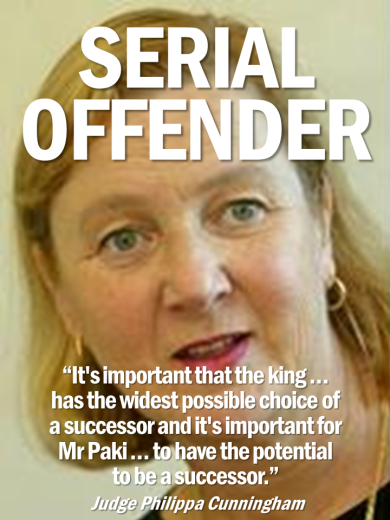
Judge Philippa Cunningham has “form” in slapping celebrities
with wet bus tickets. This time the Queen’s law enforcer prefers to
work for the Maori King.
It’s clear from her comments in the Rotorua Daily Post that Judge Philippa Cunningham is a dangerously craven, politically correct fool of a judge.
‘In sentencing, Judge Cunningham said she was “driven to the conclusion” that Paki would lose out on being a successor if convicted.
“There’s only two sons and in my view it’s important that the king at the appropriate time has the widest possible choice of a successor and it’s important for Mr Paki, as one of those two sons, to have the potential to be a successor in time.”
Why is it important for a street criminal to grow up to be a king? Why is that more important than protecting the public from him?
The editor of the Manawatu Standard, Michael Cummings, got to the nub of the issue:
But the true absurdity in the Paki case lies not in the outcome, but in the logic upon which it was based.
During Paki’s sentencing hearing, Judge Philippa Cunningham asked his lawyer, Paul Wicks, to make inquiries as to the impact a conviction would have on his client’s chances of becoming king.
Wicks investigated, before telling the judge that “any conviction for any criminal offending is considered unacceptable. The chiefs around the country are often heard to say [eligible candidates] must be ‘whiter than the dove’,” Wicks said.
So, the next Maori King can be a confessed burglar, thief and drink driver, as long as the Ministry of Justice’s database doesn’t record him as such.
If Judge Cunningham took a holistic view of the case before her, she would have identified that Paki could never be considered “whiter than a dove” no matter what decision she reached regarding his request to be discharged without conviction.
Well said, Mr Ed.
THE NATIONAL STANDARD
With or without a conviction, the chiefly standard dictates that Paki cannot
be King. So why can he not be convicted?
Everyone in Tainui knows that Korotangi’s got no chance of being king — and no desire to be. In fact, the diabetic King has already chosen K0r0’s older brother as his stand-in:
In 2012 Paki announced that due to ill health he was … deputising his son Whatumoana Te Aa Paki to act in his stead.
Earth to Judge Philippa Cunningham: you are not employed as a succession-planner to the rebel court of Ngaruawahia. You are paid by the Court of New Zealand to treat all of your fellow citizens equally under the law.
THE JUDGE’S ALLEGIANCE:
TO QUEEN, NOT BOGUS KING
Someone please tell Judge Cunningham that she works for
the Queen of New Zealand, not the King of Ngaruawahia.
Multiple offending and burgling while on bail are evidently no big deal to this serial wet-bus-ticket-wielder:
While his drink driving was moderately serious, she said, the direct and indirect consequences of a conviction were “out of all proportion” to the offence.
Moderately serious? Consequences?
After previously crashing his car into a power pole while speeding (for which he apparently suffered no legal consequences), you’d think there’d be zero tolerance of any more driving offences by Mr Paki.
But no, he was let off again, even though…
Breath testing gave a reading of 761, nearly twice the adult limit and more than five times the limit for someone under 20 at the time.
Er no, actually more than 761 times, since the limit for his age was 0.
However, she said she was concerned that alcohol had been a factor in both incidents, and made the ruling conditional on receiving a report from a medical professional clearing Paki of any alcohol addiction or alcohol abuse issues.
He was also disqualified from holding a drivers licence for eight months.
Well I guess that’s something.
By the way, according to the Herald, the king was in court to support Korotangi. Did his regal presence cause the PC judge to go soft on his son?
THE DOUBLE STANDARD
An apt drink-driving ad spoof that’s doing the rounds.
So the recidivist drunken boy racer will be back hooning around the streets in March — thanks judge.
She ordered a discharge without conviction for the burglary and theft charges, in keeping with Paki’s co-accused.’
Questions:
- Were Paki’s co-accused let off because they were the prince’s “bros”? Why else would they have been let off charges of stealing over $2000 worth of property?
- Why did Paki get the same non-punishment as his mates when, unlike them, he committed his crimes while on bail for another crime?
THE ROYAL PRECEDENT
If an English court can fine Princess Anne and behead King Charles I,
why can’t a New Zealand court convict a Maori royal recidivist?
Blogger Alf Grumble points out that there is a real double standard between the way the British courts dealt with an errant Princess Anne (not to mention Charles I, who was beheaded!) and the way the New Zealand court has dealt with the multiple-offending Maori prince.
Even before she discharged the pilfering prince, Cunningham had earned her own special Facebook page “Call for Judge Philippa Cunningham to Resign”.
That was over her discharge and name suppression of a child-abusing comedian because, among other things, “he makes people laugh” and “we all need a good laugh”.
THE JUDGE’S “PRIORS”
A Facebook page demanding the resignation of the serial-offender judge.
She is also the only judge to feature three times on the list of bad judgements on the Sensible Sentencing Trust’s Judge the Judges site…
THE JUDGES’ RECORDS
Judge Philippa Cunningham and her not-so-sensible sentencing
that you definitely can’t trust.
But even Judge Philippa’s offending pales next to that of the Maori king and his representative Tuku “Fancy Pants” Morgan…
THE COURT JESTER
The king’s representative Tuku Morgan. If Paki’s
discharge was a victory, what would a defeat look like?
Morgan’s comments say all that needs to be said about the entitlement ethos of today’s Maori leadership:
Outside court yesterday, the royal family’s representative, Tuku Morgan, said the judge’s decision had been a victory for Maori and recognition of their unique culture.
“[Paki] has the right as one of two sons to be included in the process to inherit or to take the place of his father,” Morgan said.
“The judge has recognised a very important and compelling cultural difference; that he is entwined in a succession process that one day will give rise to a new head of the kingdom, and his opportunity should not be in any way shape or form minimised or compromised.”
Thanks for clearing the heir, Tuku.
So a Maori royal’s “right to be included in the inheritance process” takes precedence over the public’s right to be protected from a right royal ratbag. Welcome to diplomatic immunity, Tainui-style.
To their credit, many Maori are among the 95% of New Zealanders who disagree with the sycophantic judge and the contemptible attitude of the bogus “kingdom”.
THE COMMENDABLE KAUMATUA
Former Labour MP Dover Samuels accused the judge of suffering from
cultural hypnosis, which reminded me of another of his quotes, above.
One who condemns both the judge’s decision and Tuku Morgan’s response is former Labour MP Dover Samuels :
“I think the judge is absolutely suffering from some sort of cultural hypnosis,” he said.
“I think she’s been persuaded and I think she’s wrong, and to me I don’t think most New Zealander’s would support that.”
Paki should not have hid behind his royalty and taken responsibility for his actions, Samuels said.
“Most New Zealanders would think that this is a young man who has committed an offence and pleaded guilty to it and would have the courage to stand up and say ‘treat me no different to anybody else’,” Samuels said.
“It doesn’t matter what Tuku Morgan thinks.”
A commendable response. Samuels told Tv3:
“We have many of our young people very similar circumstances who have been confined to her majesty’s marae at Ngawha Prison … Judges need to focus on the consistency of their penalties,” he says.
Korotangi Paki should be going to Ngawha, not Ngaruawahia.
It was Samuels who, according to former prime minister Mike Moore, once said about the sycophancy of the likes of Doug Graham and Chris Finlayson, “Put a cloak on a Pakeha and he’ll go weak at the knees”.
And he wasn’t the only high profile Maori leader from the Left to criticise Judge Cunningham:
Labour Party MP Nanaia Mahuta, who is Korotangi Paki’s aunt, said the comments were unacceptable.
They did not send the right signals to young people about what was acceptable in a society such as New Zealand’s, where people were treated fairly, equally and with respect, she said.
Only problem with that, Nanaia, is that some people in New Zealand are treated more fairly and more equally than others.
THE WRONG ROYAL ROLE MODEL
King Tuheitia Paki. The man who thinks he owns your water also thinks
his son saying “Sieg Heil” can be put down to the “ignorance of youth”.
So whose job was it to educate his son?
Most organisations are the lengthened shadow of the man or woman at the top. The same applies to families.
This is how Korotangi Paki’s father the king responded to his son’s foul-mouthed anti-Asian racism and use of the Nazi/Mongrel Mob salute “Sieg Heil”:
In a statement, King Tuheitia said that he apologised unreservedly for any offence the comments had caused and had let his son know of his extreme displeasure.
(Presumably the same displeasure that had no effect when he presumably voiced it in 2011, 2012 and 2013.)
He said he did not condone racism in any shape or form, and that the ill-advised use of a gang slogan could be put down to the “ignorance of youth”.
Too true. But why is his son so ignorant?
Surely it’s the duty of a Maori monarch to impress upon his offspring the depravity of the gang culture that destroys the lives of so many of his people.
The king’s failure to do so is more high-profile evidence that poor parenting, not colonisation, is the chief cause of intergenerational Maori underperformance.
Tainui’s billion dollar asset milestone suggests it’s not a money problem, but a moral problem.
THE PREDICTABLE APOLOGISTS
Annette: If marae justice is so great, why does he keep offending?
Sadly and predictably, my Native Affairs debating opponent Annette Sykes is denying the undeniable:
“The Maori King’s son wasn’t given preferential treatment when he was discharged without a conviction on charges of burglary, theft and drink driving,” says Mana Party member and lawyer Annette Sykes.
Korotangi Paki, 19, had previously pleaded guilty to all the charges related to two separate incidents from March this year and October 2013.
His friends Te Ahorangi Totorewa, 20, Hamuera Wipoha Pugh, 19, and Raa Ngaru Smith, 18 were all discharged without conviction in Gisborne District Court on Monday over the March burglary and theft incident.
Yesterday in the Auckland District Court, Judge Philippa Cunningham discharged Paki without conviction.
Ms Sykes told Newstalk ZB this morning that was appropriate.
“The principle of equal treatment needed to be taken in to account,” she said.
“Remember [the co-offenders] were dealt with first and they got a very similar outcome. It would be wrong for three men to [be discharged without conviction] and a young man to be ostracised just because he is the King’s son.”
But hang on, Annette. You’re conveniently ignoring the distinct possibility that Paki’s three accomplices were let off precisely because they were mates of the king’s son. Why else would a gang of thieves be treated so leniently?
And more to the point, you’re also well aware that Paki’s offending was much worse than his mates’.
Judge Philippa made it clear to Paki’s lawyer that she viewed his drink-driving charge as more serious than the burglary and theft charges.
And he’d been not only caught drink-driving, but was on bail for it when he nicked the surfboards and clothes.
And they hadn’t, and weren’t.
Two reasons why he should have been dealt with differently. How many more offences should the king’s son have to commit before he receives more punishment?
Ms Sykes said Paki hadn’t been let off the charge within Tainui.
“Korotangi has really had marae justice served up to him.”
Yeah right. And what does “marae justice” mean? Surely not family violence?
One of the King’s spokesmen, Rahui Papa confirmed to the Herald that Korotangi was driving the vehicle … “When I see him, he’s going to get a big clip on his ears.”
Like spokesman, like son. Everyone in His Majesty’s court seems to be competing to be the biggest embarrassment.
As for Korotangi, how genuinely sorry is this young hoon likely to be after years of getting away with bad behaviour?
And if he is, why doesn’t he say so?
Considering he comes from a rebel tribe that breached the Treaty and illegally took up arms against the Crown in the 1860s, excuse me if I doubt Tuku Morgan’s assurance — let alone Paki’s lawyer’s — that he is “genuinely remorseful”.
More than likely they’ll all just be having another laugh at the expense of the dumb Pakeha.
THE CROCODILE TEARS
Tuku says Paki is sorry. For his crimes — or for getting caught?
All we know is that real justice has not been served, and whatever marae justice the boy has received so far hasn’t deterred him from offending (or being offensive) time and time again.
Another predictable apologist is the Maori criminal’s friend, Kim Workman of Rethinking Crime and Punishment.
THE MINIMISERS
Rethinking Crime and Punishment: essentially a movement
dedicated to making excuses for, and going soft on, Maori criminals.
Rethinking Crime and Punishment is essentially a movement dedicated to making excuses for, and going soft on, Maori criminals. Its senior advisor is none other than the former chief judge of the Waitangi Tribunal, Sir Eddie Durie.
Kim Workman’s own blog is called Smart on Crime. Now that’s a name that’s crying out for a bit of editing…
THE SOFT OPTIONS
Let shame be your punishment, says Kim Workman.
Let prison, say I.
Workman believes that all the king’s son needs is a good public shaming, and that having received that, he has now been punished enough.
Few outside the “royal” court seem to agree. I certainly don’t. I think he needs some time out in a room with barred windows .
Elsewhere on his blog, Workman goes to some lengths to portray Korotangi Paki as regal, and to minimise his offending. In the captioned image below, he refers to Korotangi, but shows instead his dignified-looking ancestor, King Tawhiao.
He implies Paki is a first-time offender when he is not. And he describes his offending as “fairly low-level”.
In describing Paki, he uses the offender-friendly word “troubled” rather than the victim-friendly “trouble“.
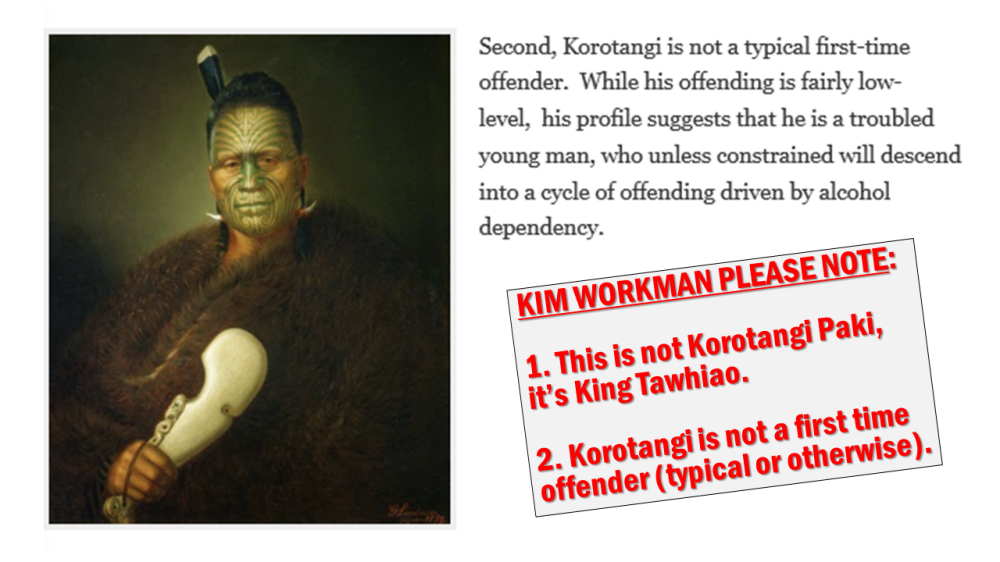
This is King Tawhiao, not Prince Korotangi. Paki is “trouble”, not
“troubled”. And far from being “not a typical first-time offender,”
he’s not a first-time offender at all. (So why, you may ask, is he still
waiting for his first conviction?)
Tawhiao, by the way, would actually have approved of Korotangi Paki’s illiteracy:
He preached that Kingites should keep separate from Pakeha. He was strongly against Maori children going to school to get an education.
As a result when the railway went through Kingite territory Kingites were only able to get unskilled jobs such as bush clearing.
This strong anti education stance started a Kingite tradition that led to increasing isolation and lower standard of living than Maori experienced elsewhere in New Zealand.
It was not until after the turn of the century that Kingites were finally persuaded to abandon their hatred of formal education in schools.
If you want to understand where Korotangi Paki is coming from, it’s from a tribe and a King who were passionate about ignorance. Hopefully they’ve learnt a bit since those days, though many problems clearly remain.
Kim Workman’s blog reveals the alarming statistic that…
for Māori males born in 1975 [the year of the Treaty of Waitangi Act – JA], it is estimated that 22 percent had a Corrections managed sentence before their 20th birthday, and 44 percent had a Corrections managed sentence by the age of 35.
So despite 39 years of indulging Griever Maori’s every whim, just over one in five Maori males born at the dawn of the Treaty grievance industry had been a guest of Her Majesty’s prison service by around the time of the Tainui settlement.
And a decade and a half later, after many more settlements and the creation of a $40 billion Maori economy, the percentage of those 1975 babies who had done time was almost one in two.
THE BAD STATS CONTINUE
Billions in Treaty settlements making no difference: of Maori males born
the year the Waitangi Tribunal was founded (1975), 20% had a Corrections-
managed sentence before they were 20 (1995), and 44% by 35 (2010).
Kim Workman, in case you’re wondering about his motivation, is part-Maori.
As, much to his apparent consternation, are 53% of our prisoners…
THE OVER-REPRESENTATION
The differential treatment of Maori within the judicial system.
Just one more revelation from Workman’s blog before finishing up on the subject of the Maori king’s son.
Presumably the purpose of the above graph is to bemoan the unfairness of more Maori being locked up than fined. No doubt the Rethinking Crime and Punishment people regard this as evidence of racism on the part of the authorities.
But of course, there’s another possibility: that Maori commit most of the serious crimes, and not so many of the non-serious ones.
THE FORGOTTEN VICTIM
More dishonesty from the boy who could be king.
Paki’s supposedly sincere remorse did not extend to him offering a sincere apology — or in fact any apology at all — to the manager of the Gisborne holiday park from which he had stolen the surfboards.
His claim to have apologised was evidently a right royal lie.
One of the victims of the crime spree, Matt Moore, manager of the Waikanae Beach Top 10 Holiday Park, said it didn’t seem the young men were held to account.
“I think everyone should be held to the same standards. I was a bit surprised [with the judge’s decision].
“They talked about having contacted everyone and apologised, but they didn’t contact me. It was negative publicity for my business and I never heard from them.”
Another spoof doing the rounds.
And yet despite this failure at the first hurdle of the restorative process, Judge Philippa Cunningham…
…praised the work Paki and his friends had undertaken in terms of restorative justice and community work, as well as an on-going mentoring programme.
I rest my case.
The excesses of the son of the Maori king, coupled with those of the Harawira family, are evidence that in radical Maoridom, the underclass extends into the highest echelons of the ruling class.
Until some brave civilised Maori speaks out and turns his or her people against the glorification of primitivism and the anti-social behaviour embodied in the haka and the powhiri, the culture of violence and dishonesty will not change.
Until that person emerges, the least the rest of us can do is refuse to condone it.
The last thing we should do is indulge it.
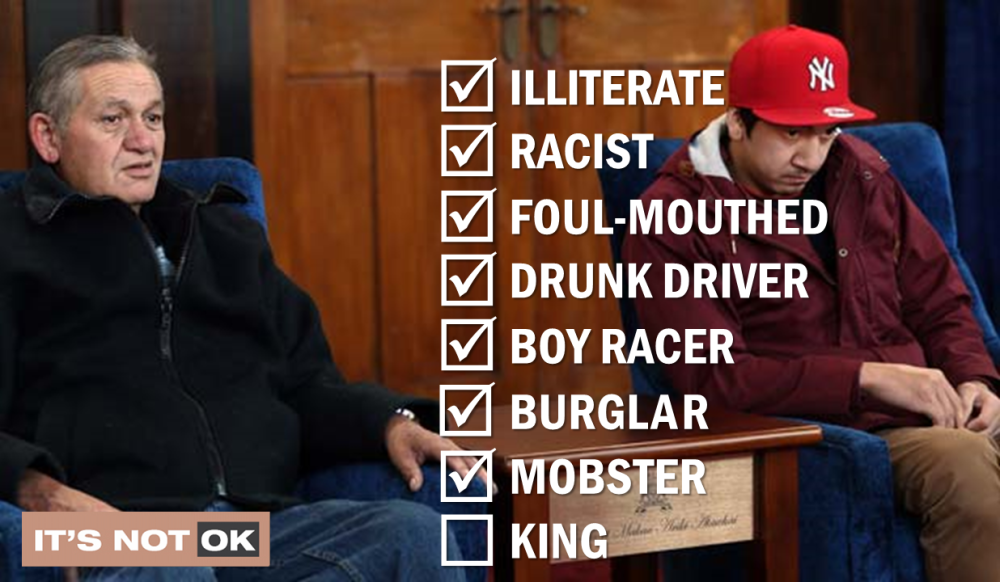
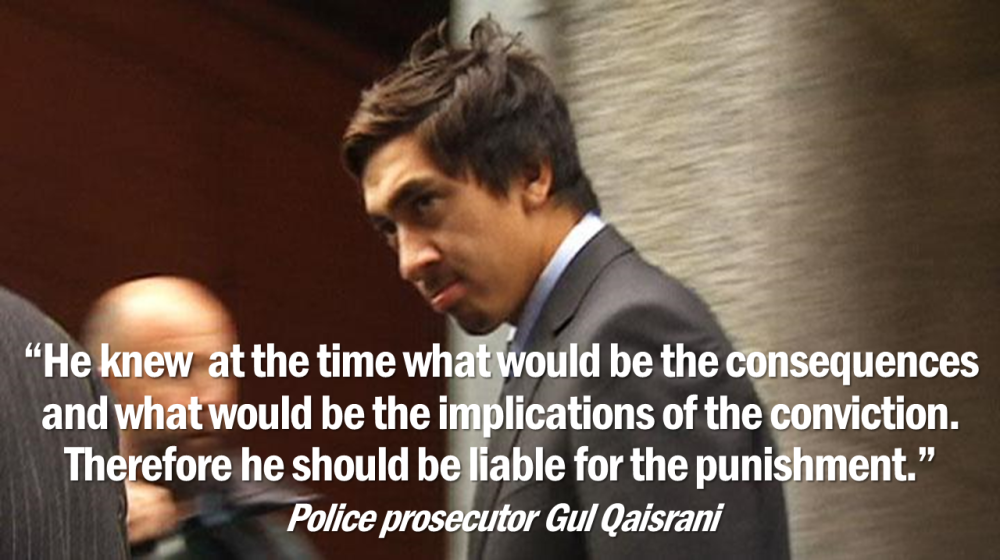

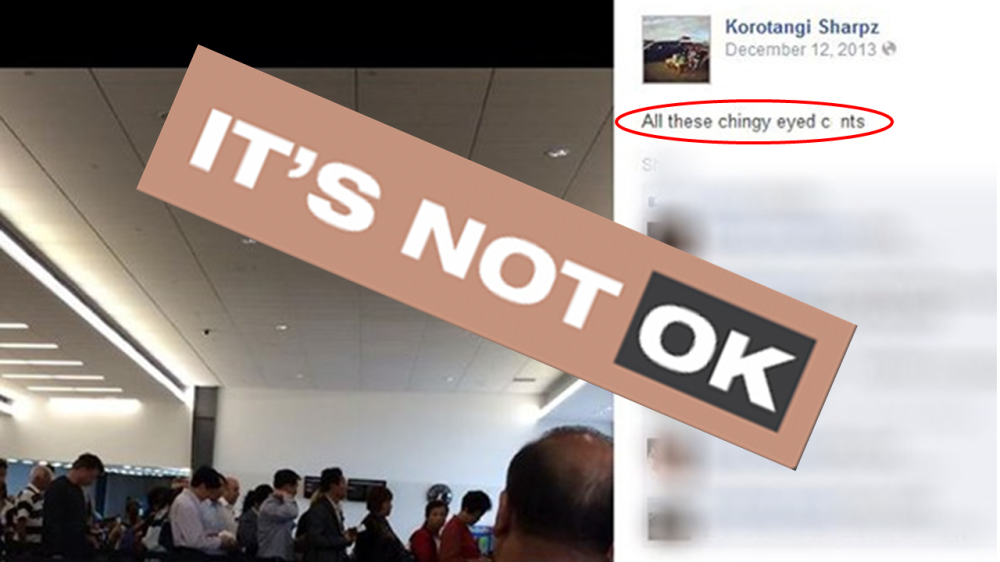

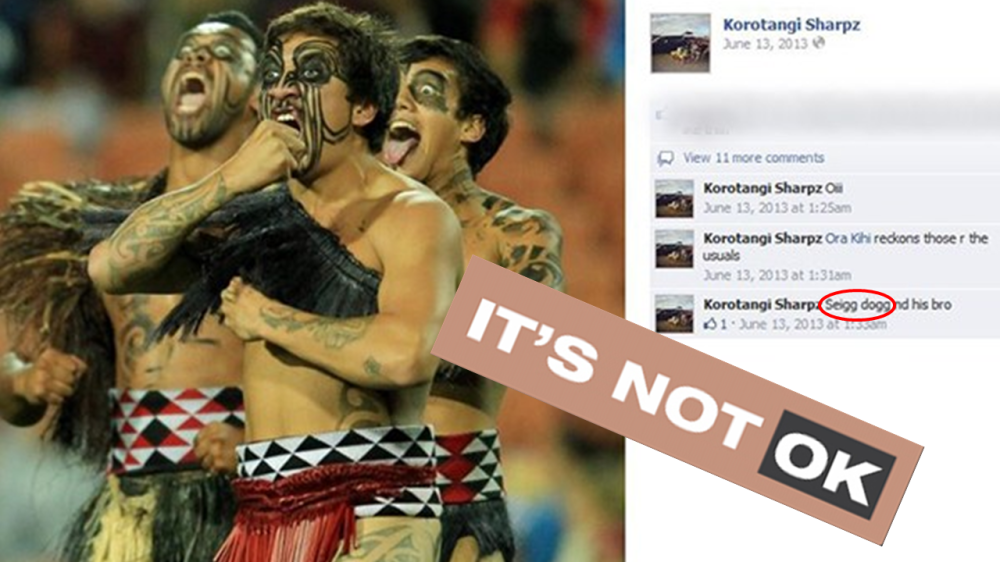
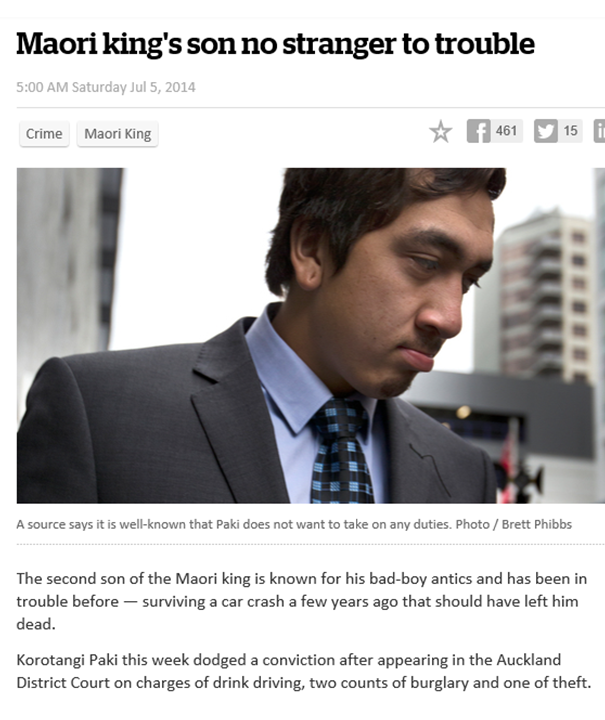
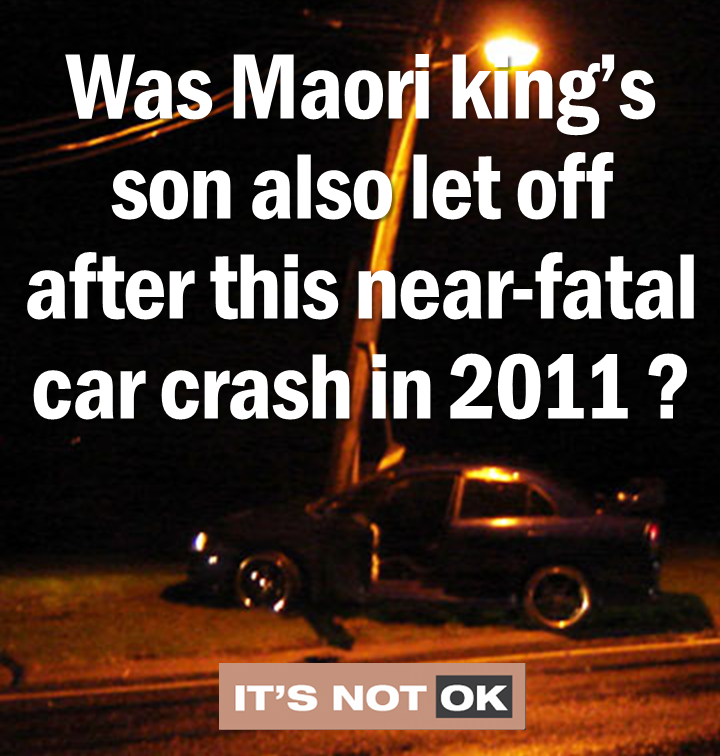
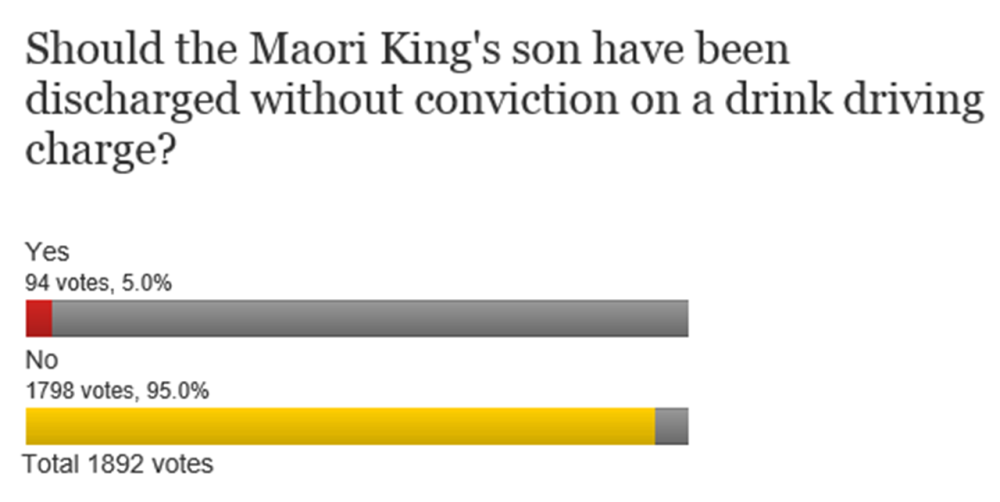
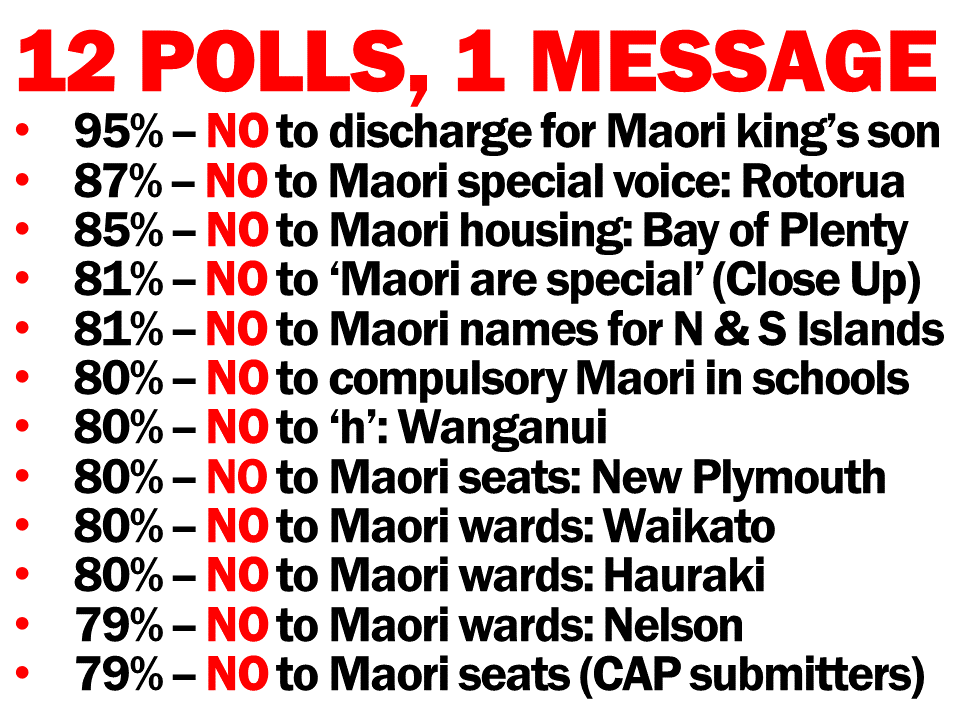
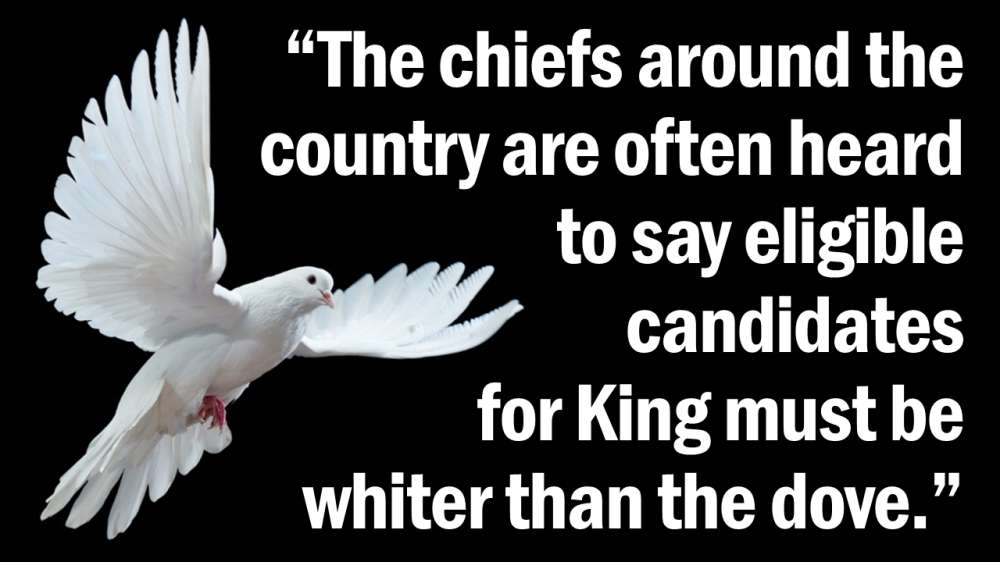
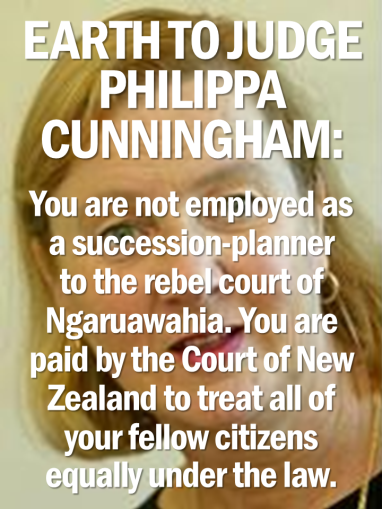
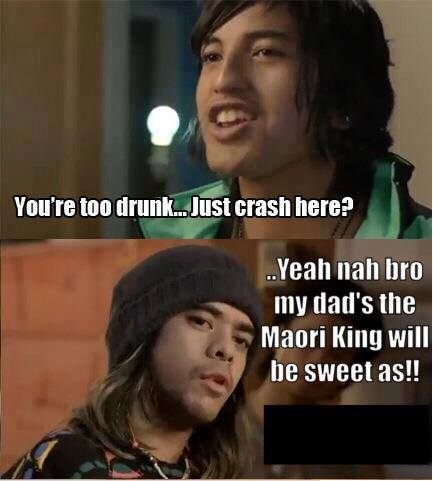
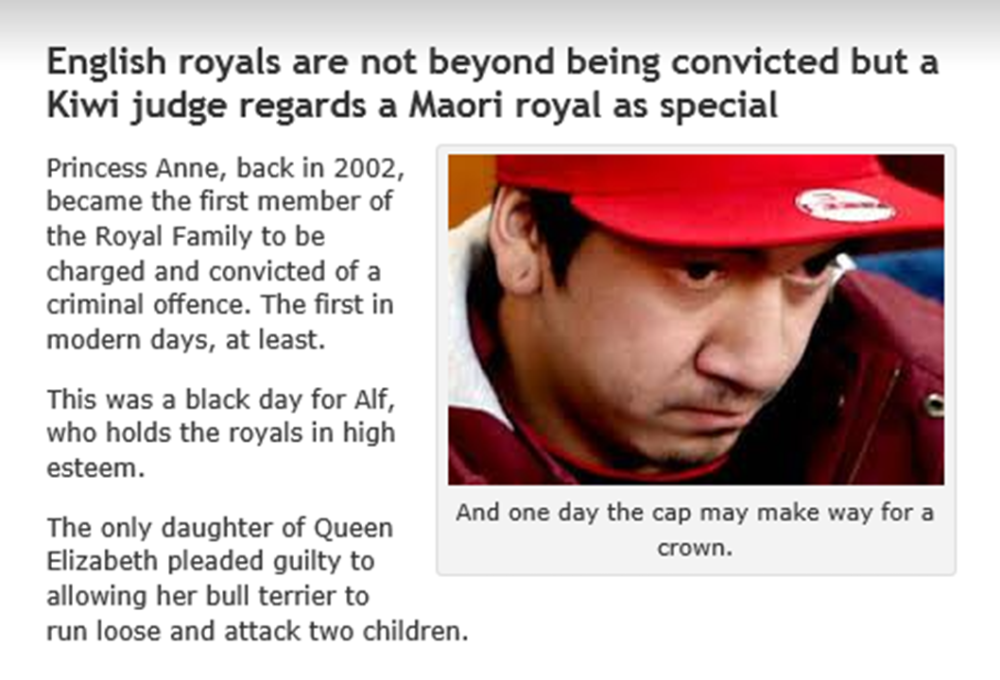
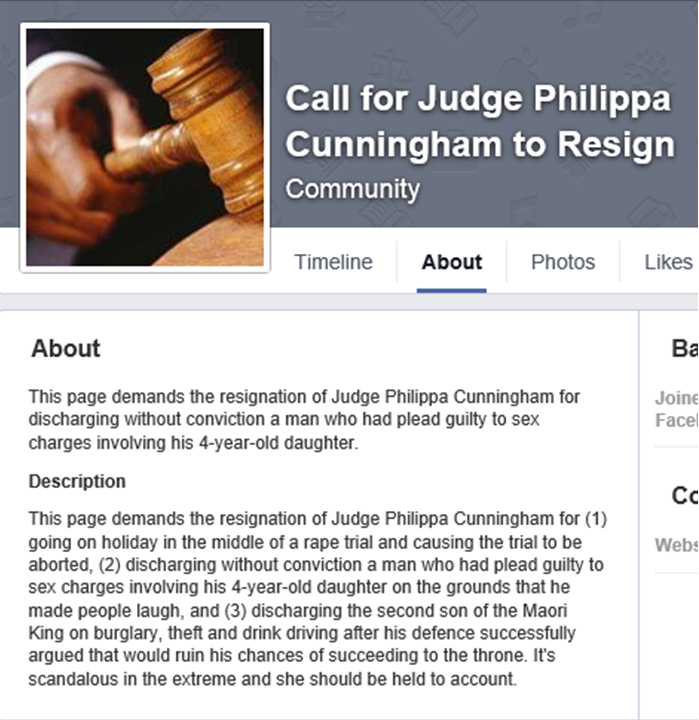
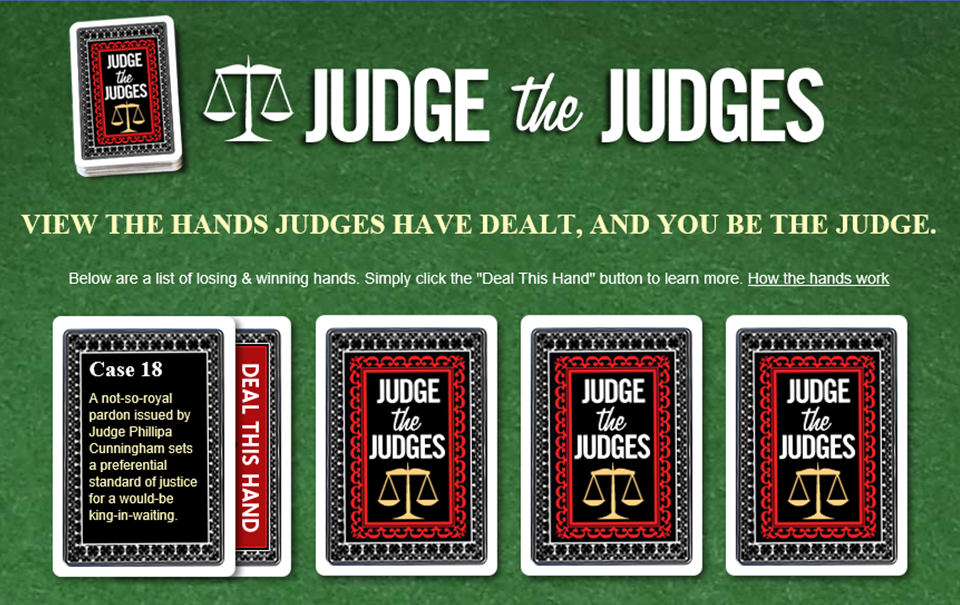
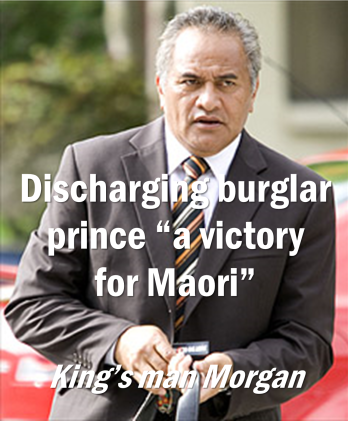
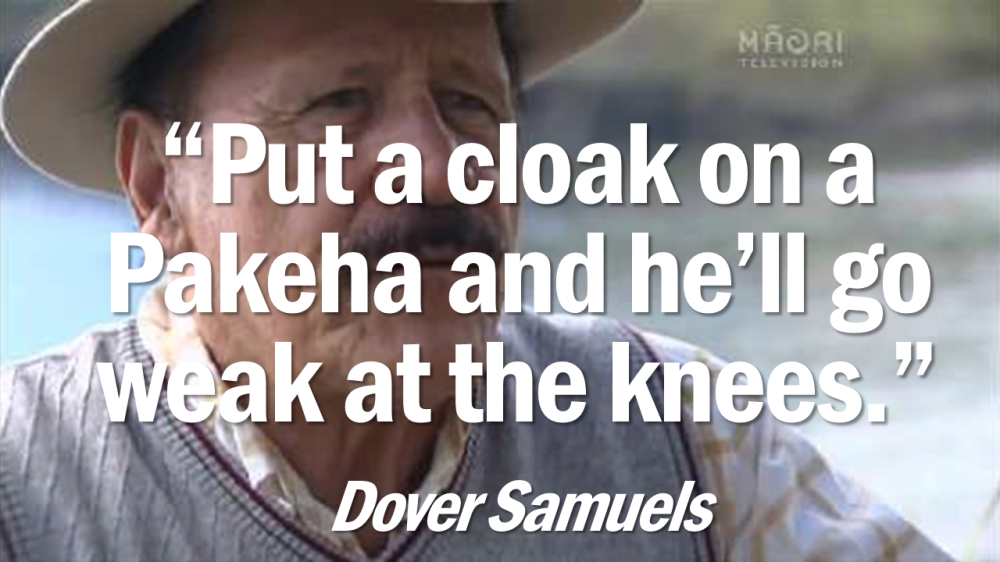
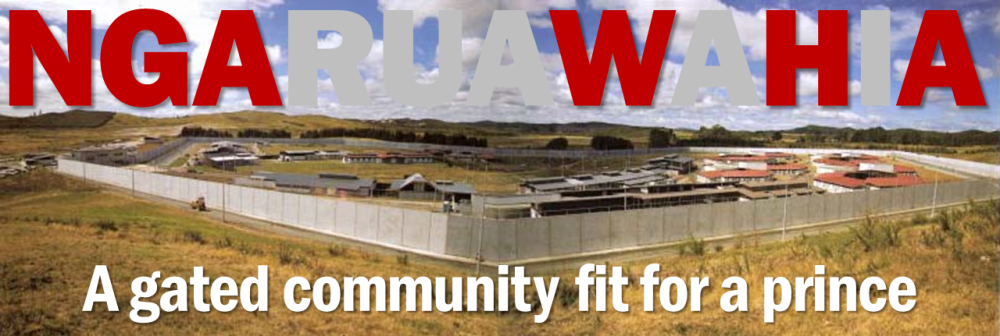
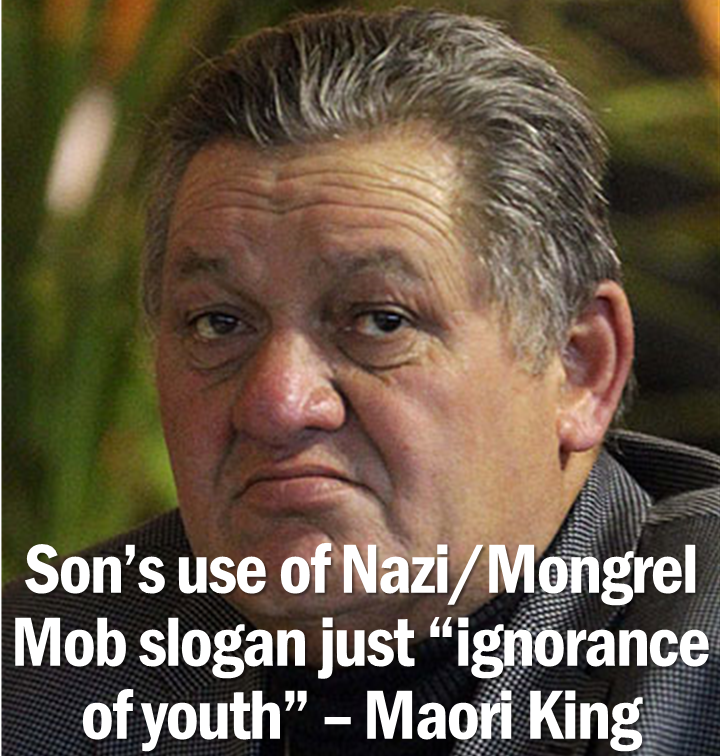
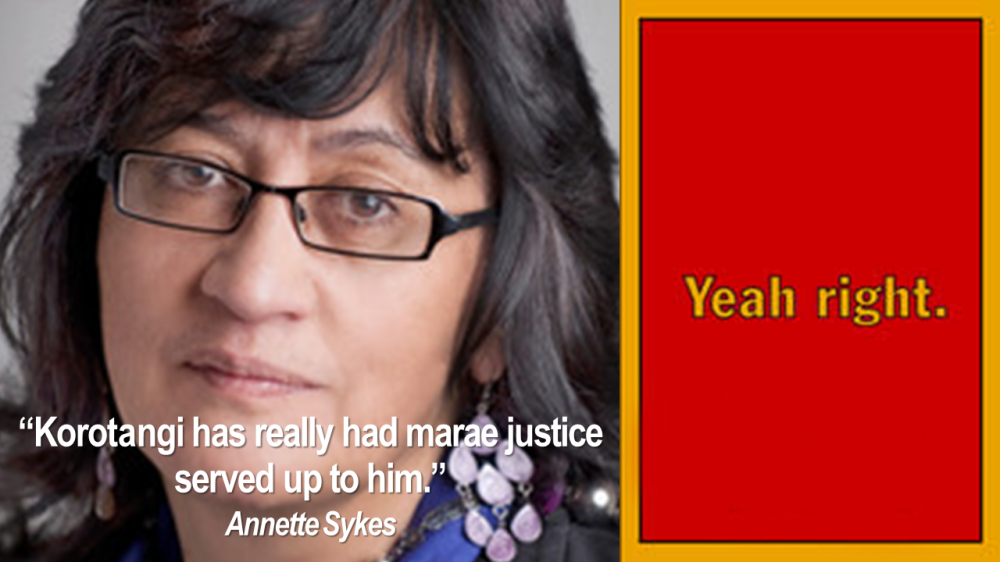
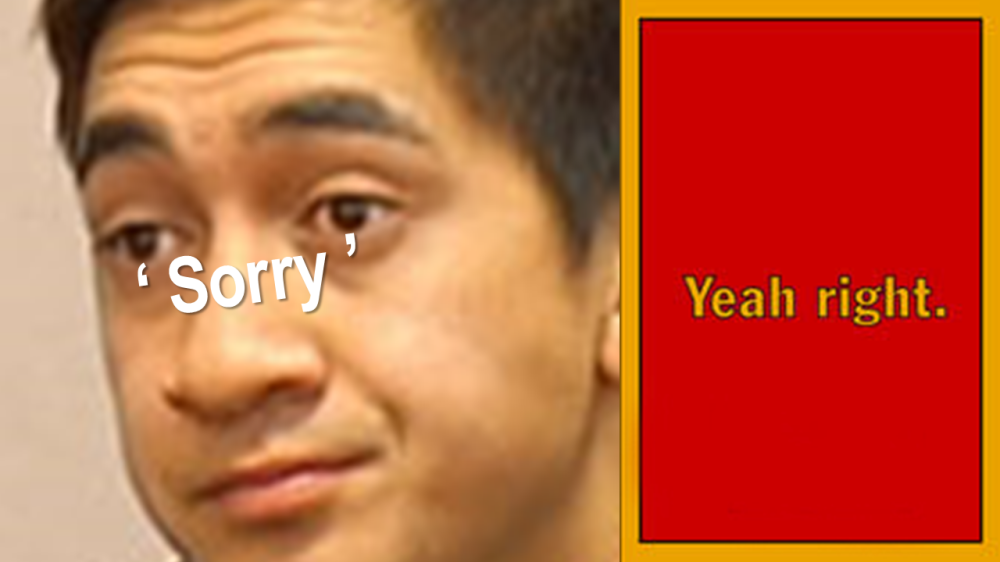


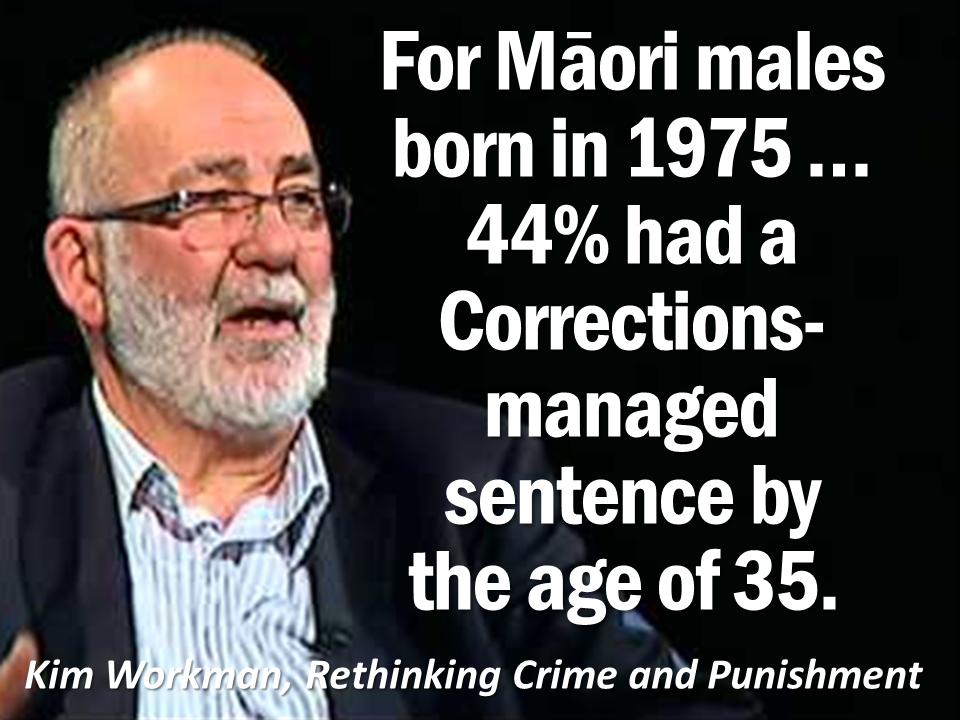
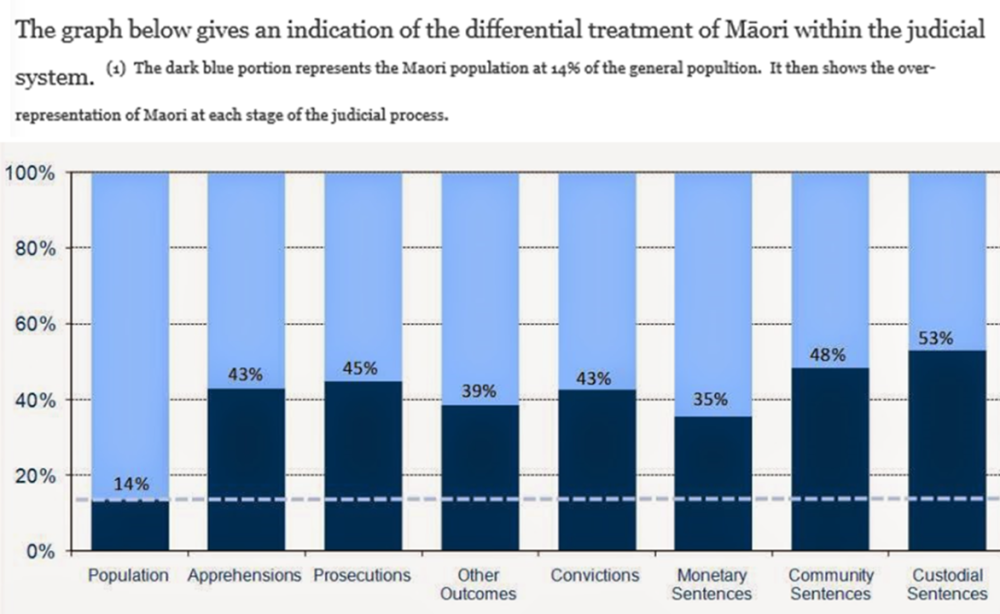
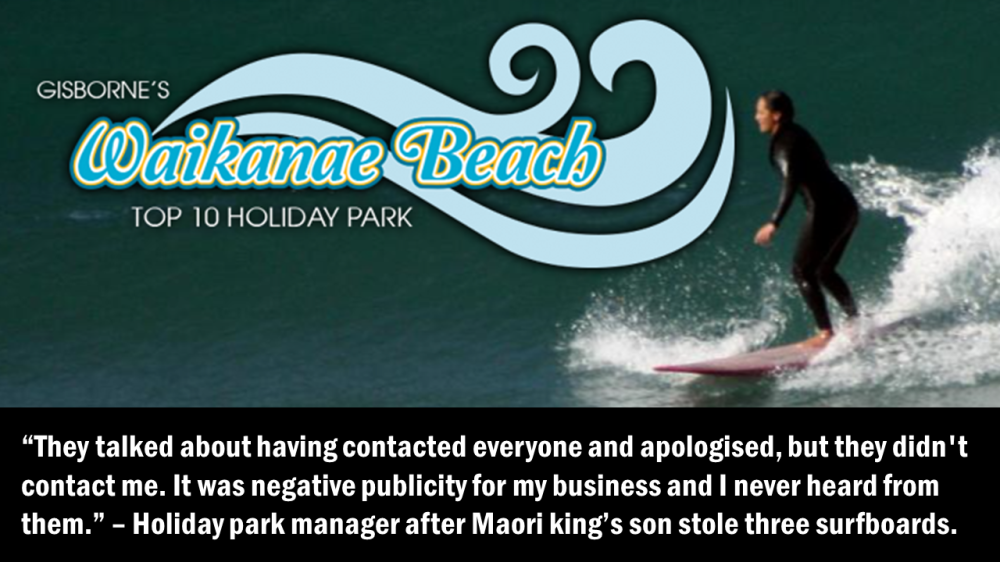
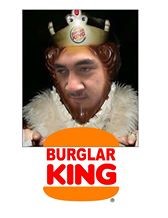
luckily you have a better command of the English language than I do, all I can think of to say is UNBELEIVABLE.
Well done John. It highlights yet again how horrendously out of kilter we are as a nation and how deeply separatism has become entrenched in the fabric of our society. I shudder to think what NZ will be like in 20 years. Awful, just awful.
Thank you KC. Even separatism is not as bad as primitivism. That is the national disgrace: the relentless embrace of the primitive and the barbaric, and the shameful denial of the riches of thought and deed that underpin Western civilisation.
It’s not because they are Maori that I attack the tribalists. It’s because they are primitive – in their thinking, in their boorishness, in their glorification of their barbaric past.
I want to provoke a debate in Maoridom about whether glorifying violence is working for them.
I want the sane among them to ask the radicals why they think those of European descent do not conduct ritual witch-burnings on public holidays, or hanging-drawing-and-quarterings for old times’ sake.
And yet Maori think it’s appropriate to intimidate their opponents with cannibal war dances, and welcome their guests by waving spears and poking out their tongues.
And they wonder why their people are so violent.
I hope this post attracts attention and causes them to have this debate. No doubt I will be vilified in the process, but that won’t matter if the higher purpose is served.
My next post will be even more hard-hitting – a teacher’s account of the indoctrination of our teachers and children. If we are to win the battle, the key battleground is academia.
Well, when you see it all laid down like that no wonder many of us are totally fed up with all things ‘Maori’. Even though there are good things relating to the ‘Maori’ side of things, they pall into insignificance with all the bad things and the latter take over completely. I want to see an end even to the word ‘Maori’. In my subconscious something pops up every time it’s mentioned and screeches ‘delete’!!!! It’s in every aspect of our lives in a bad way and is costing us literally billions which could be put to much better use for everyone. ‘These people’ mostly have more other ancestry and it is totally insulting to that side of their being that they not only ignore it but elevate the, what has now become, negative side of their ancestry.
I’m all Maori-ied out – big time.
The enemy is not Maori, Helen. It’s the focus on primitivism at the expense of civilisation.
Tribal Maori embrace primitivism and must be opposed. Civilised Maori do not, and should be encouraged.
So you think Helen that Maori is in every aspect of our/your life? In our Parliamentary and tax systems? In our laws regarding ownership and property? In our use of money? The lack of tribal life? Maybe it is.
Can I ask why you think your subconcious screeches delete everytime you hear the word Maori?
If we see an end to the word Maori will we see an end to Maori people? Assuming they don’t just vanish off the face of the Earth, will it solve these problems or make them worse by making them feel more out of place than they already do?
Each year the Government allocates money into all areas of our society, such as, housing, education and healthcare for the lower socio-economic goups, which for one reson or another, include many Maori. This however, doesn’t qualify as Maori aspects costing us billions. How do you propose we put this money to better use?
Honestly I don’t think surpressing an already surpressed culture will do much good to any of us. That would make them more confused, more angry and probably more rebelious. I think we should try to learn more about the culture, particularly the more sensitive parts of it and warmly invite it into our society.
While there are many people, incidents and statistics that cause us to question the integrity and depth of Maori culture, I think as a whole we are doing pretty good.
I think every person of every race has something to learn from all other races. I have a huge amount of respect for the Maori who so tightly hold on to their heritage and past. These two things are driving factors that mold our character. Our character defines our destiny.
We must remember that our great nation was forged between two different and distinct cultures – Pakeha AND Maori.
I too would like to welcome the more sensitive parts of Maori culture into our society.
But unlike you, I do not respect those who tightly hold on to the grossly insensitive parts.
I agree our character defines our destiny, but to me, holding on to a violent heritage does not reflect well on Maori character.
To reject it would.
The actions of a few can ruin it for all.
Judge Philippa Cunningham should stand down or be fired. The Maori “Prince” should be re-trialed and convicted. He is a disgrace and an embarrassment to his family, to Maori, and to all Kiwi’s. So too is Judge Cunningham.
But, we must remember that we are not all like this. We are not all so callous in our actions. And we are not all so disregarding of our family name, our honour, and our mana. Korotangi Paki is trouble. He is also troubled as many of us are.
I know a number of haka, I have been welcomed into groups, families and tribes through various powhiri, and like my Maori ancestors I use these cultural rituals to channel my emotions, to control my anger, and to cultivate my potential.
I understand that for many, haka and powhiri are boorish, backward, and primitive looking but, for those of us who are educated enough to embrace the true meaning of these ceremonies, they are a means to living a meaningful, prosperous and happy life.
If these expressions of culture are fueling youth violence, we should educate those people. Just like we do with alcohol, drugs and safe sex. Removing any of these things (drugs meaning prescription) from society in other words suppressing them would probably make matters worse.
The inter-generational effects of colonisation are rife in this country. Yes partly due to poor parenting, but who were those parents brought up by? And their parents? Maybe they are poor parents as a consequence of colonisation.
Maori were some of the healthiest people on Earth before European encroachment. by today’s standards they lived an extraordinarily active lifestyle and feasted on a rich diet of fresh seafood and vegetables. Children were well cared for and nurtured as the entire tribe was their parent. Everybody lived at school and they all had jobs.
Now look at us. We are obese, uneducated, unemployed, lonely alcoholics. It is no wonder more Maori are killing themselves than any other group in this country. Call us primitive but 170 or so years is not enough to undo and re-direct thousands and thousands of years of evolution.
The Government should work tirelessly to right the wrongs and breaches of the treaty they committed.
Maori are victims of their own circumstance.
I was raised by my Pakeha Dad with my five siblings in a damp, over-crowded and under-fed home. We lived well below the poverty line.
Four years ago I was a college prefect, I represented my country in my chosen sport, I sat three scholarship exams and graduated high school with merit.
My Pakeha doctor told me I was depressed. He fed me Pakeha medication. He gave me Pakeha treatment. At this stage I wasn’t sure if I was Maori or a brown-skinned Pakeha. The treatment didn’t work and twice I attempted suicide and failed. My Iwi reached out to me and welcomed me with a powhiri. For some months I stayed on a Marae. I learnt about Maoridom, ancient karakia, and sacred haka. The kaumatua taught me how to see, how to feel, and how to understand my culture.
I am now part of my iwi, or a network of people with similar experiences. Once a month we come together and stay on our ancestral grounds and practice traditional ways of life. We do not hold on to this because we are a “primitive” race. We do hold on to it to strengthen each other, just like our ancestors did. We hold on to it so we do not succumb to alcoholism, drug dependency, and the benefit. We hold on to it so we don’t kill ourselves. We hold on to it because we can.
Since the powhiri I haven’t taken any medication for depression, I haven’t seen any psychologists, and I haven’t woken up in the critical care unit. I am not preaching Maori healing and saying that western medicine doesn’t work, because I know it does.
So many kiwi’s choose to drink, smoke drugs, and to kill themselves because they don’t have an identity. I am fortunate enough to be a part of an iwi and a culture who does.
The treaty settlement claims look to return what was taken so Maori identity can be restored. It is so one day Maori will feel like they belong in this modernised and westernised world.
I dream of the day when all men are created equal, when we a judged not by the colour of our skin, or because we are a Maori Prince, but by the content of our character.
Some people think they are light-skinned Maori, others brown-skinned Pakeha. I identify as both. And so I dread the day when we live in a colourblind state. When culture does not exist. It is culture that makes us unique. And it is uniqueness that makes us human.
Where would we be without it? Probably on a paddock, following the flock for the sake of following, roaming endlessly for the lack of a better option, with no identity, and no hope.
Opinions appreciated.
Yours,
Born in NZ.
Born in NZ: thank you for your articulate and thoughtful comment.
To summarise:
1. Like me, you deplore the actions of both the prince and the judge.
2. Unlike me, you value haka and powhiri because you have gained emotional strength from the way these powerful rituals have connected you to your Maori side.
3. You feel less attached to your Pakeha side because a) you look Maori, and b) because the Pakeha medical system did not work for you.
4. You have derived great value from the way your iwi have welcomed you and made you feel part of the iwi and good about being Maori. This has given you the sense of identity you’d been yearning for and missing living as a “brown-skinned Pakeha”.
So far I’m with you and can understand your point of view. If those rituals have real therapeutic value for people, I can see why you would not want to give them up just because some white guy thinks they’re too violent.
I can certainly appreciate the value of gentle, soothing rituals like karakia and poi actions songs.
The violent haka and powhiri I find harder to justify in a peaceful world. Foreigners find it ridiculous, though enjoy the spectacle. I just find it sad that such hostility is required to give someone a sense of identity.
Also, it seems likely to me that such raw displays of anger, repeated often, must affect the wiring of the brain and help condition a young man to accept violence and anger as normal. (Rather like a kid watching endless horror movies.)
I’m happy to be corrected if the evidence is against me.
What I certainly don’t approve of is the inflicting of these rituals on those of other cultures who do not appreciate such naked aggression.
Being compelled to respect such inhuman, insensitive displays of hostility in the name of cultural sensitivity is, to me, absurd and wrong.
To continue…
5. You accept the rose-tinted Maori version of history that says pre-1840 Maori lived happily in a South Pacific idyll, where food was plentiful and children were treated with unfailing kindness.
6. You agree with the descendants of the rebels that colonisation wrought great wrongs upon Maori. You even opine that generations of poor Maori parenting may also be the fault of the British, though you don’t say why or how.
7. You believe the Crown should work tirelessly to right the breaches of the Treaty they committed.
There are several things you seem unaware of, or unwilling to acknowledge…
1. Maori were the most violent race on Earth before the British had even got here. Between 1805 and 1840, about one-third of them were wiped out by other tribes in over 1000 battles. Hardly an idyllic environment in which to grow vegetables and raise children.
2. Female infanticide (usually by mothers squeezing their skulls) was endemic, as was cannibalism – again, hardly the mark of a healthy society.
3. It was Maori who breached the Treaty by taking up arms against the Queen. Apirana Ngata acknowledged this. To start the clock at the confiscations is as dishonest as Hamas trying to win sympathy today by blaming the Israelis for attacking Gaza.
(Mind you, this doesn’t stop the media according them that sympathy, much as NZ media and academia bend over backwards to present Maori as victims.)
In short, Maori are disproportionately violent now because they were disproportionately violent then.
Maori culture is disproportionately concerned with violence, and I think it would be helpful to replace that emphasis with a focus on more benign aspects of life. (Like the Buddhists do.)
Other societies have modified their cultures to suit the changing times. So can Maori.
Until they do, and as long as they keep blaming their liberators for their predicament (the people who abolished Maori slavery, cannibalism and genocide, gave them property rights for the first time, and introdued them to the wonders of the modern world), they won’t be respected and they won’t improve their lot.
That’s my opinion.
Absolutely, totally, 100% agree. Well said!
Brilliant John! At your best!
Brilliant think !!!
I am an asian (i can said this as i am looks like) who immigrate to New Zealand 5 years ago, my parent is part of japanese, korean and indonesian so if somebody ask me my nationality a bit hard to describe it.
No offence or racism but i have a bad severals experience during my 5 years in NZ with maori’s people including violent and racism (not mention when i am walking down in the street at night and a few guys ask me for a coin push me and swearing at me).
For me its a matter of how our parent educated us or what they implant in us which make us a well behavior person or the other side.
What i am trying to say here is i never ever had a bad experience with kiwis so how come it become so coincidence? is it just a bad luck? Am i in the wrong place with the wrong time when its happen?
No it is not …
I believe to make us a better person or a better generation we must admit our fault or reckless or selfish or the way we educate our kids because i believe whey they got mature its almost impossible to change them as we can see people who’s done a bad things they will face court and jail and then as soon as after they free they did it again and the circle is keep going. The way to a better circumstances always hurt but i believe its worth to go through.
I love New Zealand
I really love New Zealand
I feels like this is home for me now, i might be born in somewhere in one part of this world but i will have my last breath here, in New Zealand.
Anyway from the deepest of my heart i want to thanks to anyone who accept a people like me, a stranger who come to your country hoping for a better life.
I am really grateful for that.
Thank you Dani. You sound like the sort of person – typical of many who have come here from Asia, including my wife – who will be a great asset to New Zealand.
I’m sorry about your experience. Sadly it’s not that uncommon. But I’m also pleased you realise that most Kiwis are not like that.
I hope the rest of your time in your new homeland will be everything you hoped it would be.
Born in NZ, a colourblind state does not mean what you are implying. No one wants to get rid of anyone’s culture. It is absolutely what makes us a great society.
What is destroying the fabric of our society is when one of those different cultures, (colours), are treated as more special than others, when they get benefits or different treatment under the law than the others. That is a recipe for discontent, resentment and ultimately civil unrest.
A colourblind state is one where all colours are treated equally, especially by the law and government. Where they all have the exact same benefits, opportunities, responsibilities and rights as each other. Only then will we have a truly great nation.
Now that I’ve explained that – I take exception to your statement that Maori are the way they are because of colonisation. That is a cop out. Finding other people or circumstances to blame for a poor showing is just another way of avoiding taking responsibility.
You cannot blame something that happened 170 years ago for the failures of certain people today. Billions of dollars in compensation and help have gone their way and they still show poorly in the statistics. It has nothing to do with colonisation and everything to do with attitude and behaviour.
I agree that special treatment for some is destroying the fabric of our society. While I am terribly afraid it will tear our country apart, I can’t think of a better alternative. What do you propose?
The various laws put in place to disadvantage Maori such as the Native Land Act, Public Works Act and Tohunga Surpression Act along with other things were all a recipe for discontent, resentment and civil unrest. Should we simply brush it under a mat and move on or work to address those things and the resulted consequences?
I think everything that was unjustly taken should be returned to Maori. But I accept that is unrealistic and so the relatively small compensation they are currently recieving is reasonable.
The wealthy upper-class will always be priviledged and the poor lower-class will always be underpriviledged. As long as classes remain people will never have the same benefits, opportunities and rights.
I understand where you’re coming from with the effects of colonisation. A huge number of Maori have poor attitudes, bad behaviour, brush off responibility and blame others for where they are in their lives and in the statistics. We cannot pinpoint why this is so as there are many contributing factors. I don’t believe colonisation is a cop out and I know it is far from the only reason these problems exist. It is hard to see but to say it has nothing to do with colonisation is just ignorant. There is plenty of proof of its effects on people today, in all cultures who were colonised not just Maori.
Large sums of money have controversially been put into solving some of these issues but you must understand it will take far longer than a few decades for the benefits to be evident.
Brush it under the mat? No. Acknowledge genuine wrongs of the past, but enough compensation has been paid and it’s definitely time to move on.
The benefits Maori gained from colonisation far out weigh the disadvantages, which is something most deny or ignore, but you only have to look around you to see it all.
The very fact that you are alive today is a direct benefit of colonisation in two ways – firstly because with the constant warfare, female infanticide etc, Maori were on a fast track to extinction before white man got here; secondly, as you have blood other than Maori in your veins, if that other bloods ancestors had not come here, you would not be here.
So while you might think that billions of tax payers money is a ‘small compensation’ for a few acres of scrub and bush, you might put some thought into the kind of lifestyle Maori would be living if NZ had never been discovered by pakeha.
1. Totally.
2. Totally.
3. Totally not. Although I believe Maori healing and connecting with that side of my heritage saved my life, I am by no means less attracted to my Pakeha side.
Mostly I feel less attached to my Maori side because I live in a Pakeha world, in a Pakeha house, went to a Pakeha school, work at a Pakeha organisation, wear Chinese clothing and drive a Japanese car.
But, my upside has always been in the pride I draw from both sides of my heritage.
– I will find evidence on the neurological and psychological benefits of haka and powhiri. For now, my opinion stands. If it is taught properly, it is learned properly.
The first haka I half learned was Ka Mate at Intermediate school. My teacher was a German woman and the only other brown face in the class was my brother. Her pronunciation, actions, translation, and protocol were all wrong. It tranferred to us. Until my iwi taught me properly, I was always embarrased to perform, be it for my college 1st XV, playing for my country, or on any other special occasion.
When senior students bullied me, sometimes two of them, I would retaliate and often win the fight – kids called me a ruthless gangster. I would cuss at the kids who teased me, calling me a “hori Maori” for going to school in bare feet – we couldn’t afford shoes. I would screw up my face when kids told me my hair was curly because I didn’t eat white bread with the crusts cut off -they probably thought I was doing a pukana and didn’t know it was genetic.
I was a reserved, hurt, and often very angry young man. Now I know I am susceptible to mental illnesses like depression, bipolar, and addiction. Maybe my brain is wired this way because my ancestors were a cannibilistic and violent race, it could be because of the haka, or it could be because I was marginalised by a hugely non-Maori and largely white society.
5. I also accept the blood-tinted version of Maori history.
6. Why, how? My mother was born in Otara, South Auckland, as was my Grandad. He had a job at the freezing-works like so many other Maori during that period. They could only afford poor quality, low nutrient foods like bacon bones and processed bread. He died at 56 from various heart problems and I never got to meet him. My mother only had access to low-decile schools, bad food, and bad healthcare. She too suffers from heart problems and mental illness, she is also obese and an alcoholic. She grew up in an area with liquorstores and fish and chip shops on every corner, with low income jobs, few doctors and no universities. Yes, she could have made better descisions and taken more responsibility in her actions but can we really blame her or her father? She is a victim of her own circumstance.
My iwi had control of the entire Auckland area. They had gardens that fed 20’000 people, one of the biggest fisheries and trading ports in the country, and there were docters in every village. They had a huge economy and colonisation broke it down. It forced tribal lands to become private lands which were quickly onsold, Maori doctors were prosecuted, and sick Maori were denied or couldn’t afford western treatment, colonisation meant we couldn’t support ourselves. We weren’t allowed to fish, to build, to speak te reo. We were dispersed pushed to the bottom rung to become the scum of society.
I always thought if she was raised in Parnell, would things be different? Bad parenting or a result of marginalisation through colonisation?
7. 1 and 2 have nothing to do with treaty negotiations.
7. 3. It was not Maori who took up arms. It was some Chiefs and some iwi. Yet, all Maori were punished. The Crown and the Government breached the Treaty too, over a longer period and with worse consequences
If in short Maori are disproportionally violent now because they were disproportionally violent then, then surely Maori are disproportionally underprivelledged now because they were disproportionally underpriveledged during colonisation.
Maori have modified their society and adapted greatly to this new white and western world. Of course we are still struggling but that is expected and it is changing.
No race needs to be colonised to change or to enjoy luxuries of the outside or modern world. It comes from the trading of goods and conversing of ideas, the intermixing of two peoples.
Born in NZ – so was I, by the way. I was bullied at school too. Being bullied at school is not something that happens exclusively to Maori kids. My last name was True – it rhymed with Poo – you can guess at the rest. Also my mother was one of the school teachers. So if she told someone off, or gave them the strap – they took it out on me. Them and their friends. I had a terrible time at school, and home wasn’t a lot better.
But attitude is what determines how you let that affect you. Most of us have little control over what happens to us in our lives. But it’s how we react and what we do about those events that make the difference.
You talk about your susceptibility to mental illness. Many people of all races have that. It’s the epidemic of the 21st Century a Doctor once told me. My daughter has been on anti depressants since she was in her early 20’s – they’ve told her she will have to be on them for the rest of her life.
I’ve had some very traumatic things happen in my life from which I developed post traumatic stress disorder. I’ll be on medication, probably for the rest of my life. Plus I now have arthritis in all the major joints in my body and ill be on addictive pain killers the rest of my life.
I could get really bitter and twisted and angry about these things because they prevent me from living the life I wanted to have, planned to have. My arthritis was brought on by a couple of accidents I had. I could get angry and try and sue the Melbourne City Council because I tripped on the edge of their foot path. I might even win and get some money. But that would not change anything and in the long run it wouldn’t make me feel any better, and it certainly would not make me a better person.
My mother died before her time, and suffered terribly in the months before hand, because the Doctor got his diagnosis wrong. Again, we could probably sue, and get compensation. But it wouldn’t bring mum back. It wouldn’t give my dad any comfort. He’s not bitter and twisted and angry about it. He’s getting on with his life as best he can.
Anger, bitterness, hate – those emotions are destructive to the person who feels them – not to the person or government that their anger and hate is directed at.
I chose to not get bitter or angry, because that’s not the kind of person I want to be. So I manage my pain and limitations and find new ways of bringing joy into my life.
My point here is that we all have trials and tribulations in our lives. Everyone. Not just Maori. Pakeha don’t go around blaming their problems on the fact that NZ had a population of dark skinned people taking up space in their new chosen land and that it’s all their fault that pakeha couldn’t get enough land to grow as much produce as they really wanted to. We don’t go around complaining that our family was deprived of certain ancestors because Maori killed and ate them and we don’t now demand compensation for those wrongs.
I believe that if a lot of Maori stopped dwelling on the wrongs of the past and focused on the good and the advantages and making the most of them. we’d see a whole new culture emerge. A proud, forward thinking, progressive and successful one that would bring pride in the Maori of today and the future, rather than having to look to the past to find role models.
Clinging to the past, as so many seem to want to do, is preventing them from moving forward. From seeing and taking advantage of all the opportunities out there for them.
I know ancestor worship is a big thing for Maori. But keeping it in perspective and remembering that those ancestors lived in a different time and place. But remembering, teaching, that their deeds, done back then, are not appropriate today and in modern society, is extremely important.
You say “Maori doctors were prosecuted, and sick Maori were denied or couldn’t afford western treatment, colonisation meant we couldn’t support ourselves. We weren’t allowed to fish, to build, to speak te reo.” – I don’t believe any of that. You would have to show me absolute proof of any of that because I don’t believe that is true.
As for Maori doctors – how many of those ‘doctors’ had been to Med School? They weren’t doctors, they were medicine men. Herbalists if you were lucky, but more likely they worked with superstition, spells and incantations. That’s not a criticism – it was all they had to work with and didn’t know any better.
But by the time pakeha came here medicine or doctoring had advance way beyond that and it would have been only natural for the Europeans with their knowledge of western medicine, to feel that Witch Doctors would do more harm than good. They would have believed, at the time, that they were doing what was best for the maori people. They would have been trying to protect them from what they saw as a primitive practice. Arrogant maybe, but their intentions would have been good.
Many Maori say that their was a systematic and deliberate attempt to try and rid the world of the maori race. I don’t believe that. I believe that their was more likely a lot of well intentioned but possibly misguided attempts to bring Maori into western civilised ways too quickly.
We know, because we’ve seen it time and time again in the animal kingdom, that when circumstances change drastically for a population – you either adapt or you die. Well colonisation would have been just such a circumstance. Lots of Maori have adapted and are doing extremely well. You yourself are a good example. But too many are still resisting and fighting the changes.
That does not mean you have to discard your culture in order to be a brown skinned pakeha. What it means is that you look at your culture. You put the parts that no longer serve you behind you. Not lost or forgotten, remembered as an important part of your history, but in the past. Then you take the parts that do serve you well and also take from the new civilisation you find yourself in, the good that will serve you well and you build a life for yourself. That is what all peoples, all civilisations have had to do to advance, progress and survive.
Mostly, do not believe all you read, hear or are told about how colonisation has affected Maori. There is so much at stake. Too much to be gained by claiming that Maori are disadvantaged or marginalised, or underprivileged. It’s not in the best interests of the Waitangi Tribunal, or the Maori elite’s to say anything else. Those ‘disadvantages’ and ‘underprivileged’ bring them huge money and power. Without ‘victims’ they have no claims and their whole income streams disappear.
Phew, this is getting too long. Hope you’re still reading 🙂
Born In NZ
“The various laws put in place to disadvantage Maori such as the Native Land Act, Public Works Act and Tohunga Surpression Act etc”
The person responsible for sponsoring the Tohunga Suppression Act 1907, was Sir Maui Wiremu Pita Naera Pomare, known for his efforts to improve Māori health and living conditions. ( http://en.wikipedia.org/wiki/Maui_Pomare)
Note to John A. According to this Wiki article, Pomare was the boy injured at Parihaka when the trooper’s horse trampled his foot.
When my wife did her Nursing Degree, I had the opportunity to read Pomare’s journals that she was using for reference material. I have been unable to find a link to these for you as they are well worth a read. Amongst other matters, Pomare described the sleeping conditions of the typical overcrowded whare puni as having less fresh air and room in them than a coffin, water sources for drinking and washing at papakainga being contaminated by traditional sanitation methods, and large numbers of people dying from treatable diseases and injuries at the hands of Tohunga. By and large, these conditions were not as a result of loss of land or colonialism.
I live in a small coastal community where the number of Pakeha families could be counted on one hand. Some 40 years ago, everyone here and along the East Coast had large and impressive vegetable gardens. Those gardens had continued right through the colonial period but have now almost disappeared. Most locals now buy their vegetables and even fish from the supermarket. Heaven forbid, I even see locals buying kindling wood for the fire from the supermarket, despite the beach and surrounds being littered with it.. It is not the pressure of full time employment that is stopping the gardens from being planted, or crossing the road to catch a fish, it is the easy availability of some one else’ money to live on that has killed off independence and work ethic in many. No land was confiscated here by the Crown and much of the area is still in Maori ownership. It is welfarism, as predicted by Sir Apirana Ngata, and cannabis and alcohol dependence that are the main cause of the ills that we have on the Coast.
Thought I should add as well that it is also not the loss of gardening skills for the lack of home gardens. I have seen some great crops planted up in the hills where water and fertilisers have had to been hand hauled to at considerable effort. Again, 40 years ago, cannabis was the sole domain of the alternative culture type Pakeha and surfie in this neck of the wood. Its use and acceptance today with Maori is so common that it is now a part of our way of life. A Coast nurse when asking the required and routine medical question to the new patient, “Do you smoke?” accompanies the question with two hand signals to the mouth, one indicating the holding of a cigarette between two fingers, the other the thumb and forefinger grip of sucking on a cannabis roach. The response is returned in the same manner without a word being spoken.
I spoke to a tourist not so long ago who was quite shocked to see outside the supermarket, a couple of kids around 12 years of age clearly under the influence of cannabis He was from the city, and not just the kids state but the adult locals who were present and accepting of it was clearly an an eye opener to him.
What about the effect of unemployment? Beneficiaries here would outnumber the working. Forestry is the big industry with government estates having been handed over to Iwi concerns. A logging truck operator moved to the area two years ago. He had to move his business back to the city because he could not get local drivers. Contractors have problems finding drug free workers.
I mentioned that my wife did her nursing degree. That was a few years back, but still after two Iwi that she is part of received large TOW settlements. I think her studies cost around $15,000, but she was was unable to access grants/assistance from those Iwi to assist her. Will she or the kids, who are also Tuhoe ever see any benefits from these TOW settlements? That is a rhetorical question.
Thanks for your post. I enjoyed reading it.
Thanks Tamati.
Yes, the Tohunga Suppression Act was sponsored by the great Dr Pomare.
But just as signficantly, it was supported by ALL the Maori MPs, such was their distrust of natural healers like the self-styled prophet Rua Kenana, whose treatments caused many deaths.
The kind of squalor that Pomare described was, of course, also a feature of British society when medical science and sanitation were in their infancy.
And a distressing unintended consequence of the coming of the British was the lack of Maori immunity to deadly European diseases.
But one glance at Maori life expectancy today versus what it was in 1840 is surely enough to confirm that Western medicine has been overwhelmingly beneficial.
If it wasn’t for the lifestyle choices you outline, those figures would be even better.
I should say that I’ve been reading The Maori King by Sir John Gorst. Gorst’s account of the war period has caused me to have much more sympathy with the likes of Wiremu Tamihana and other Maori leaders than I had previously.
I see no reason not to believe that Tamihana, in particular, was a great and thoughtful man and peacemaker.
The British, by contrast, come across in Gorst’s view as clumsily compassionate, at best, and arrogantly dismissive at worst. Their failure to provide the services they promised to the Waikato people was uppermost among the reasons for the creation of the King movement.
It was a sobering read.
But my newfound sympathy does not alter the fact that Tamihana and co. did defy the Crown – even after Grey promised to establish said services – and knew what the consequences would be of setting up a parallel kingdom.
They took the chance and lost, and were punished in accordance with both British and Maori tradition.
To describe the confiscations as unjust is wrong. It’s certainly possible to argue that they were excessive, in the same way that we might argue that the levying of reparations against Germany after World War I was excessive and counterproductive.
(Mind you, it wasn’t excessive in Maori terms, who would have confiscated lives as well as land had they won.)
Most importantly, none of the historical rights and wrongs can be used to justify the glorification of primitivism over civilisation.
We may sympathise with the way some Maori were treated 170 years ago, but the attitudes of those times are long gone and it is ludicrous to feel bound by a fraction of shared body chemistry to justify a wholesale replacement of our advanced cultural heritage with one that is 3000 years more primitive.
John
Another great post you.
Last year I posted that I had downloaded, free of charge, some 20 odd period books and journals related to the NZ colonial period. The Maori King by J.E.Gorst was one of them, and I agree about your comments on Tamihana.
Those books are still there for the downloading at:
https://mebooks.co.nz/index.php?route=product/category&path=39&page=2
I think if you have not read Aureretanga:Groans of the Maori by G.W.Rusden, download it as it adds another perspective to the Taranaki Question.
regards
I left this message in reply to Matthew Dentith’s epistle above (feel free to give him the benefit of your perspective too):
Matthew, nice try, but anyone who reads my post with both eyes open will see that your criticism is, as always, flagrantly one-eyed and deliberately misleading.
Your attitude to conspiracies is laughingly simple: left-wing ones approved of by you are fine, but right-wing ones described by the likes of me must be ridiculed and rejected.
I think most right (as in balanced)-minded observers would regard such bias as itself ridiculous.
The correct approach, in my view, is to analyse any so-called conspiracy on the facts, not to demonise it simply because it is thought to be a conspiracy – or, more to the point, a conspiracy not sanctioned by Matthew Dentith.
Yes, I have contempt for that aspect of Maori culture that glorifies violence, as well as for the prevailing tendency of the New Zealand state to indulge primitivism and promote it over the virtues of civilisation.
That, please note, is a far cry from having contempt for other aspects of Maori culture, or for Maori people.
All societies were once primitive and barbaric, but why we need to celebrate it is beyond me.
And not just me, but the 80% of New Zealanders who, in 12 polls that I listed on my post but you failed to mention, have consistently rejected all forms of racial favouritism in what is supposed to be a democracy.
The opportunity cost of glorifying primitivism in our education system is immense. While our children could be learning “the best that has been written and thought” from the days of Greece and Rome down the centuries to the present day, they are force-fed false New Zealand history and forced to engage in the cannibal war dances of “the noble savage” by teachers who cannot graduate from teachers’ colleges unless they agree to be trained parrots of the politically correct neo-Marxist elite.
That is barbaric.
Yes there is certainly a conspiracy to indoctrinate our children with racist claptrap. That is all too clear. But that will be the subject of another post.
The post you refer to seeks to highlight much more than the Maori prince’s drink-driving, as you well know, and as open-minded readers will quickly see.
Upon reading it, they will likely wonder why you would want to misrepresent my point and pretend that my chief concern was Maori drink-driving.
It was not. But by pretending that it was, you were able to employ the age-old lefty trick of equivalence, and try to skew the discussion to the respective treatment of Maori v Pakeha drink-drivers. This sort of diversion fools no one.
Open-minded readers will be amazed that you tried to hoodwink them into believing that drink-driving was Paki’s only crime.
Why, they will wonder, did you leave out the rest of his catalogue of criminality and thuggishness – the two burglaries, the theft, the racist Facebook comments, the foul-mouthed video rant – all evidence that he should not remain in contention for the throne?
Why, like Annette Sykes, did you leave out the very salient fact that, unlike his accomplices, Paki committed the burglaries and theft while he was on bail for drink-driving?
Why did you truncate my question about whether Paki’s mates might have been let off because they were mates of the prince, to make it look as though I was stating that theory as a fact?
Then, of course, there was the other main target of my post: the weak-kneed (and white) Judge Philippa Cunningham. Why did you not mention that I was just as angry about her?
You deviously pretend that I am now angry with all things Maori. There is no evidence for that and it is not true.
Just yesterday I had an excellent conversation in my local cafe with a Maori special needs teacher, who wholeheartedly agreed with my opposition to racial preference. And he was even angrier about the so-called “leaders” who claim to represent him than I was.
He could see that my beef was not with all Maori, or all aspects of Maori culture – only those people and those aspects which seek to lock Maori into the distant past.
I don’t think that’s unreasonable, and neither did he. (And neither does the owner of that cafe, who is also Maori.)
Finally Matthew, I must pull you up on the tiresome tendency, common among radical Maori and appeaser Pakeha, to say that there cannot be Maori privilege because Maori are at the bottom of every bad social statistic.
As I hope your open-minded reader will have spotted, that is what we call a logical fallacy.
I expect no better from uneducated loudmouths like Hone Harawira or Willie Jackson. But such ignorance does not befit a learned academic.
The fallacy, of course, is that it is quite possible to provide a group of people with special privileges, and still not cause them to improve their position.
That lack of improvement is a strong argument for the suspension of the privileges.
In this case, despite billions of dollars of taxpayers’ money having gone to Maori in Treaty settlements and numerous special payments, the bad stats have not improved one iota.
That does not mean there were no privileges and payments. It means that there are reasons for Maori underperformance that money cannot fix.
Matthew R.X. Dentith attempting to ensure he gets more work from Waikato University.
If you’ve got nothing better to do, I recommend joining my ‘discussion’ with Matthew: http://all-embracing.episto.org/2014/07/17/the-naked-contempt-of-john-ansell/#comment-22185.
While you’re sitting there ticking off all his time-honoured lefty factual-argument-avoidance strategies (mainly of the insult and divert variety), keep in mind that this man – who is so drippingly politically correct that he insists on referring to New Zealand by the catchy handle Aotearoa me Te Wai Pounamu – has been awarded a PhD by Waikato University.
(Topic of thesis: Conspiracy theories – Why all the Left ones are right and all the Right ones are wrong, red-necked and utterly contemptible.)
But I should acknowledge, on a more human level, that Matthew was once kind enough to warn me about a Twitter impersonator who was tweeting havoc in my name. He didn’t have to do that, and I was grateful to him for it.
I think sometimes that those of us on different sides of the political barricades have more in common with each other than with those who do not man the barricades at all.
Fantastic excellent outstanding work John. If I had read this 20 years ago, I would never have believed it. Now, it does not surprise me. This country is in big trouble when democracy is tinkered with by the loony PC left.
“Blah, blah, life’s not fair.” No shit Sherlock!!
Well its 2016 have you changed your colonist opion on maori as a whole? Of course its a jackup that kid got off but you act like its a maori issue-more like the priviliged. A violent race? Obviously you dont know thr true british history or you wouldnt on your high horse…A rebel hmmmm thats what they called Ghandi go figure.
I have never had a bad opinion of “Maori as a whole” – only the Treatifarian troughers.
So Maori aren’t a violent race because the British were. What sort of logic is that?
All races were violent, including the British. Maori remain disproportionately so, because (in the words of the woman now leading Te Tii Marae) “we’re only four generations out of cannibalism”.
That’s the truth. Nothing for you to be ashamed of – you weren’t there. (Just as I didn’t use to burn witches.)
So why deny it? Why not take a leaf out of her book and acknowledge it – and try to fix it?
Anybody see that racist anti-democratic mayor from New Plymouth on the TV during the last 5 days ? Yes, I agree people should not spit at him etc. However, his racist contempt for democracy is equally abhorrent. His claim is that maori are special and treaty partners and a minority so deserve a free seat on the council. What about the other minorities who were treaty partners? He calls himself a ‘recovering racist’ when he is no such thing. He is a blatant racist with no respect for the basics of democracy. Hard to believe he got elected in the first place. And a massive thumbs up to people from new Plymouth who voted ‘no’ to his racist anti-democratic proposals. Maori can get elected just like everyone else…just like other minorities such as balding men, blonde women, pensioners with false teeth, Asians, people allergic to peanuts etc etc. Hope he stands down ASAP.